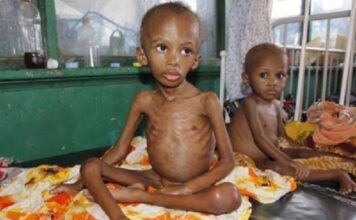The organization known as Médecins Sans Frontières, or Doctors Without Borders, revealed that it provided medical treatment to 208,644 individuals as outpatients and 52,278 individuals as inpatients for malnutrition in Nigeria in 2023.
Dr. Simba Tirima, the Country Representative of MSF in Nigeria, shared this information during the presentation of the organization’s 2023 activity report in the country at a press conference held in Abuja on Tuesday.
According to the report, there were significant numbers of individuals suffering from malnutrition in Nigeria in 2023, highlighting the ongoing need for medical intervention and support in the region,
“689,979 outpatient consultations, 80,089 inpatient admissions, 322,010 patients treated for malaria, 689,979 outpatient consultations, 80,089 inpatient admissions, 21,758 deliveries, 2,616 caesarean section, 125,366 antenatal consultations, 12,255 children treated for measles.
“4,701 patients treated for cholera, 229 patients treated for meningitis, 364 patients treated for Lassa fever, 14,832 patients treated for diphtheria, 785 patients treated for tuberculosis, 2,384 survivors of sexual violence assisted, 299 reconstructive surgery for Noma survivors, and 276 vesicovaginal fistula surgeries carried out.”
Dr. Simba Tirima, MSF’s Country Representative in Nigeria, highlighted that MSF has been operating in Nigeria for over 25 years, since 1996, and currently has ongoing projects in 11 states: Bauchi, Benue, Cross River, Ebonyi, Jigawa, Kano, Katsina, Kebbi, Sokoto, Zamfara, and Kano, as of December 2023.
It mentioned, “In all the states where we work, we work in government facilities, and in many ways, we engage some of the staff from those facilities to work with MSF staff as well. And so, we’re clearly under the auspices of the authorities in the Federal Government and the State Governments of Nigeria.
“MSF engages employees – more than 4,000 Nigerians to do the job that we do, our international colleagues here are about 10 per cent, and the results that you see revert to our Nigerian colleagues who are competent in doing that job.
“Of course, we have donors. MSF doesn’t take institutional funds, we don’t take government funds, we have private, individual donors, 97 per cent of our funds come from that source, and without those donors, we wouldn’t be able to deliver the very much-needed aid that gets to the most vulnerable people in this country.”
Karsten Noko, the Head of Mission, reported that Nigeria has seen a significant outbreak of measles in the first quarter of 2024, with approximately 8,000 cases reported, and laboratory confirmation of 52% of these cases.
Additionally, he expressed concern about the rising number of hospitalizations due to malnutrition in various states, including Bauchi, Kano, Borno, Zamfara, Sokoto, and others where the organization operates, indicating a worsening nutrition crisis.
“In Kastina, we see also a little bit of a decrease in malnutrition cases, but that doesn’t mean that it does not exist. We handed over a lot of health facilities back to the Ministry of Health, they are also capturing a lot of malnutrition cases.
“So, when you see the burden of malnutrition existing, this is due to a lot of problems which involve the economic situation. The vaccination coverage is quite low. And you know, measles also is impacting the nutrition situation.
“Measles is a viral infection which impacts children from six months until five years, and most of it, it impacts the mucosa of the intestine, whereby the children are not able to absorb all the nutrition of whatever they have eaten, and then that will lead to malnutrition or severe malnutrition,” Noko stated.
Usman Buba Usman, the Head of Mission Advisor, emphasized the need for locally-driven and sustainable solutions to combat malnutrition in Nigeria, rather than relying on external interventions, to ensure a more effective and lasting impact.
